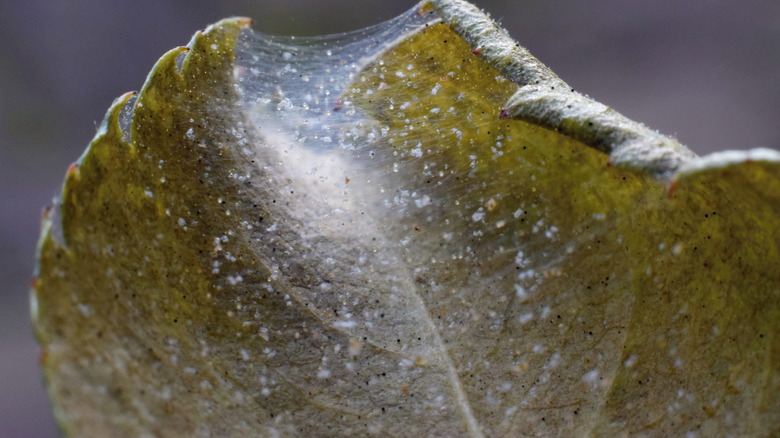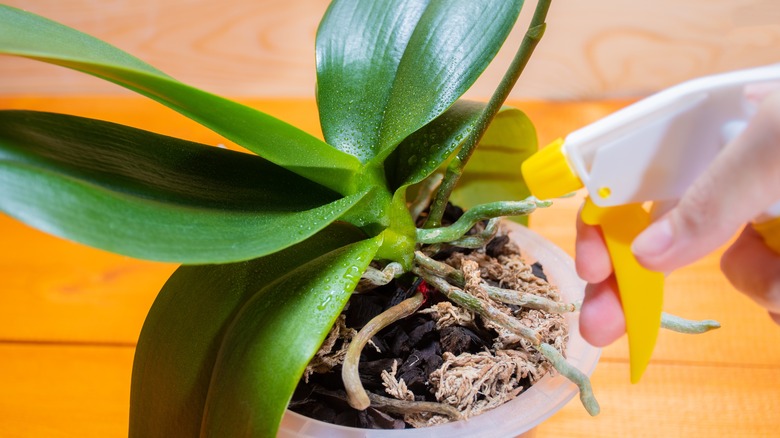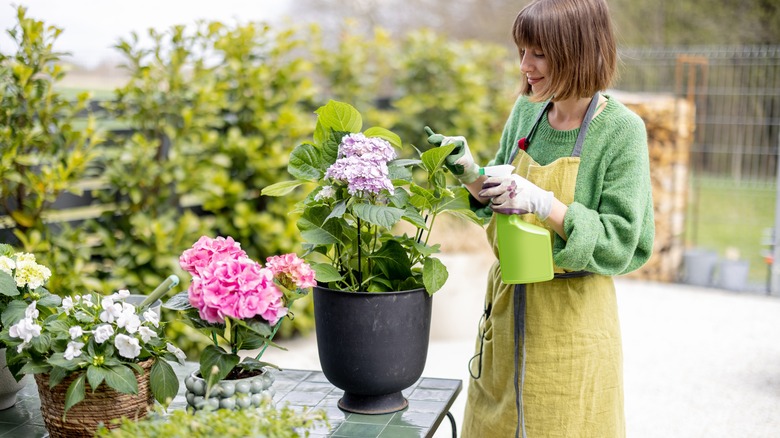The Natural Solution That Kicks Spider Mites To The Curb, From House Digest's Master Gardener
Spider mites can appear quickly on indoor and outdoor plants. These tiny members of the class Arachnida are not actually spiders, but they do share the ability to produce webbing. Spider mites are so tiny and difficult to identify in small numbers that you're more likely to see the tell-tale signs of their existence before you see the pests themselves. The earliest sign of a spider mite infestation is the presence of yellowing leaves because of the creatures' sucking mouth parts that pull out moisture. Upon closer inspection, you'll see webbing with tiny dots on the undersides of the damaged leaves — those tiny dots are the enemy.
Since mites quickly reproduce and thrive in warm conditions, your outdoor garden plants will be most susceptible to infestation during warm weather. Indoors, spider mites can thrive year-round. These microscopic menaces can hitch a ride inside your home with a newly purchased plant, but they are so tiny that they can be carried indoors on clothing, shoes, or even through the tiny holes in open screened windows.
If you find evidence of them in your home, you'll need to get rid of those spider mites on your plants. As with other tiny insect invaders, you can give your plant a gentle but thorough wash to remove the offending eggs and insects, or you can combat them with a natural pesticide mixture to prevent further damage and to keep these buggers from spreading. Rather than buying a pesticide spray from the store or online, you can mix your own anti-mite cocktail at home with some soap and essential oils.
Ingredients for spider mite spray
You may already have what you need for a homemade pesticide to fight your spider mite infestation. A mixture of peppermint soap, neem oil, and rosemary essential oil should do the trick. The liquid peppermint soap is important because the soap acts as an insecticide while the peppermint, in addition to smelling nice, acts as a repellant. The soap will also help the other ingredients adhere to the surface of your plant, trapping the pests while the rest of your mix does its work.
Neem oil is an organic pesticide that is very effective against small pests, and it should make quick work of your mite problem. The rosemary essential oil does important work, too — both oils work to suffocate the small creatures, and while neither neem nor rosemary oil is toxic to humans or animals, they're extremely toxic to spider mites. Plus, rosemary essential oil's exceptionally strong odor will keep any prospective pests from returning.
In a pinch, you can substitute liquid peppermint soap with small quantities of regular dish soap or an insecticide soap, and you can switch the rosemary oil for similarly effective oils like tea tree, lavender, or mint essential oils. Eucalyptus and lemon essential oils have also proven effective against mites. This all combines to form the ultimate weapon against spider mites — while you may see success using any of these ingredients on their own, combining them into a homemade pesticide gives you the best odds of eradicating mites.
Make your DIY pesticide
With your ingredients on hand, you'll just need a standard handheld spray bottle and some tap water. Add 1 tablespoon of peppermint soap to a teaspoon each of neem oil and rosemary oil and a liter of water. When treating houseplants, keep in mind that the smell of this mixture is going to be pungent — neem oil alone has a pretty unpleasant smell — so it's best to apply this outdoors if possible. If that is not an option, you can place your affected plants in the tub, spray them, turn on the exhaust fan, and close the door. Let the solution sit for a few hours, then you can wash it off and put it back in place.
Outdoors, you won't have to worry much about the smell, but the time of day you apply this solution is important. Because this spray includes neem and rosemary oils, it can burn the delicate tissues of your plant's leaves in full sun, so you should consider applying the solution in the evening. You might need to repeat the spraying process several more times until the spider mites are gone for good.


